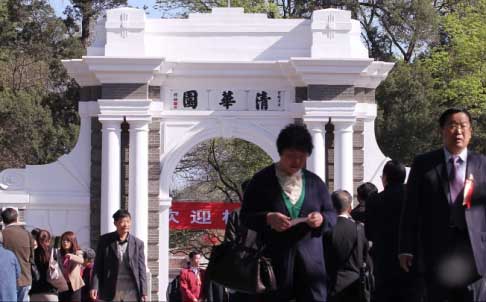 |
|
People walk in front of a historic gate in Tsinghua University, target of hacking by the US National Security Agency. |
|
Tsinghua University in Beijing, widely regarded as the mainland’s top education and research institute, was the target of extensive hacking by US spies this year, according to information leaked by Edward Snowden. It is not known how many times the prestigious university has been attacked by the NSA but details shown to thePostby Snowden reveal that one of the most recent breaches was this January. The information also showed that the attacks on Tsinghua University were intensive and concerted efforts. In one single day of January, at least 63 computers and servers in Tsinghua University have been hacked by the NSA. Snowden said the information he shared on the Tsinghua University attacks provided evidence of NSA hacking because the specific details of external and internal internet protocol addresses could only have been obtained by hacking or with physical access to the computers. The university is home to one of the mainland’s six major backbone networks, the China Education and Research Network (CERNET) from where internet data from millions of Chinese citizens could be mined. The network was the country’s first internet backbone network and has evolved into the world’s largest national research hub. It is one of the mainland’s non-commercial networks, owned by the Ministry of Education, but operated and maintained by the university and other colleges. Universities in Hong Kong and the mainland were revealed as targets of NSA’s cyber-snooping activities last week when Snowden claimed the Chinese University of Hong Kong had been hacked. Chinese University is home to the Hong Kong Internet Exchange, the city’s central hub for all internet traffic. Snowden said the NSA was focusing much attention on so-called “network backbones”, through which vast amounts of date passed. In the wake of Snowden’s claims, the Ministry of Foreign Affairs set up an office to deal with diplomatic activities involving cyber security. The new cyber affairs office is the first of its kind on the mainland with a Foreign Ministry spokeswoman saying that Beijing, long accused of cyberhacking by the United States, has been a “a major victim” of cyberattacks and that it opposed “cyberattacks in all forms”. She added that the central government would discuss cybersecurity issues with the United States at next month’s Sino-US strategic and security dialogue. Professor Xu Ke, deputy director of the Institute of Computer Networks at Tsinghua University, has previously said that most data passing through network backbones was not encrypted. Xu said most attacks on such networks were carried out by governments because individual hackers “could gain little”, as the amount of information they faced would be “colossal”. Only governments or large organisations would have the resources and manpower to “find the needle in a haystack”, he said. |
據香港《南華早報》6月23日報道,據愛德華·斯諾登(Edward Snowden)透露的信息顯示,清華大學在今年受到了美國間諜活動的密集網絡攻擊。位于中國北京的清華大學被認為是中國大陸最好的教育和研究機構。 目前并不了解這家備受尊敬的學府受到美國國家安全局的攻擊次數,不過,斯諾登透露給《南華早報》的細節揭示,最近一次攻擊發生在一月份。 斯諾登透露的信息還顯示,這些針對清華大學的網絡攻擊數量龐大且協同作戰。在一月的某天,清華大學至少有64臺電腦和服務器受到美國國家安全局的網絡攻擊。 斯諾登稱,他所透露的有關對清華大學的攻擊的信息提供了美國國家安全局進行網絡攻擊的證據,因為內外部網絡協議地址的具體信息只有對通過網絡攻擊或是物理性的訪問電腦才能獲得。 清華大學是中國大陸六個骨干網絡之一的中國教育和研究網絡(China Education and Research Network, CERNET)的所在地。這個網絡能獲取數百萬中國市場的網絡數據。 中國教育和研究網絡是中國第一個互聯網骨干網絡,并已經發展成為全球最大的國家研究中心。 這個網絡還是大陸的一個非商業網絡,歸教育部所有,但由清華大學和其他高校運營和維護。 上周,斯諾登聲稱香港中文大學(Chinese University of Hong Kong)遭到網絡攻擊時,大陸和香港的大學也都被曝是美國國家安全網絡窺探活動的目標。 香港中文大學是香港互聯網交換(Hong Kong Internet Exchange)的所在地,也是香港所有互聯網流量的中心。 斯諾登稱,美國國家安全局花了大量的精力關注于所謂的“骨干網絡”,有巨大的數據量通過這些網絡。 在斯諾登透露上述信息之時,外交部成立了一個部門來處理有關網絡安全的外交事務。 這個處理網絡事務的新部門是大陸設立的第一個相關部門,而據外交部女發言稱,中國政府是網絡攻擊的“主要受害者”,反對“任何形式的網絡攻擊”。美國政府一直都在譴責中國政府發動的網絡攻擊行為。 該女發言人還說道,中央政府會在下月舉行的中美戰略和安全對話會議上與美國的討論網絡安全問題。 清華大學計算機系網絡技術研究所副主任許恪教授之前稱,大部分通過骨干網絡的數據都沒有經過加密。 許恪稱,大部分對此類網絡的攻擊是由政府實施,因為個人黑客面臨的信息量會是“巨量的”,而“得不到什么”。 他表示,只有政府或大型機構會有資源和人力“大海撈針”。 (翻譯:趕叔 編輯:Julie) |